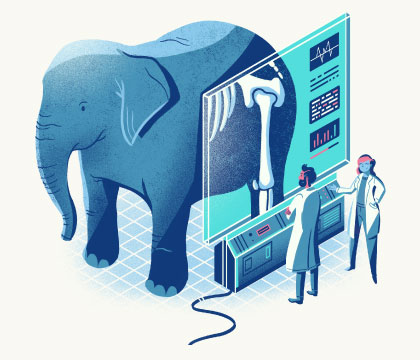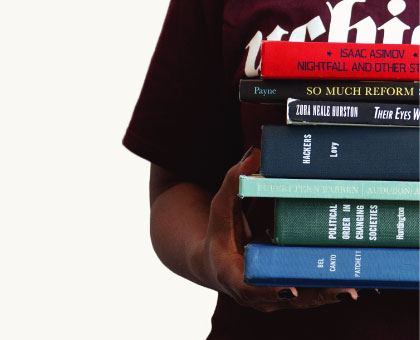|
|
|
|
|
|
|
|
|
|
|
|
|
|
|
|
| How to understand opinions you think are wrong |
|
| |
|
|
|
|
|
| "The only way to bridge our country's divides is to understand one another," reads the website for the start-up Flipside. "But most of the time, the other side just doesn't make sense." |
|
| |
|
| Siddharth Sachdeva, Class of 2018, Flipside's founder and CEO, hopes to change that. The plan is to find the best-written opinions from a range of publications and perspectives. These will be compiled into an email newsletter and website, where users can share their views and suggest additional content--with no ad hominem attacks allowed. |
|
| |
|
|
|
| The pilot issue of Flipside's newsletter will focus on the future of work: How significant will technological unemployment be? Is basic minimum income the solution, or is there a better one? |
|
| |
|
| Sachdeva is looking for volunteers--especially College alumni--to sign up for an early version of the newsletter. At UChicago, you learn to "be comfortable with being wrong and changing your point of view," he says, "over and over and over again." |
|
| |
|
|
|
|
|
| A tube map for the Roman Empire |
|
| |
|
| Why did the Roman Empire fall? Could it have been caused, as the website CityMetric suggests, "by a dearth of high quality metro maps, possibly brought about by the complete absence of ancient Roman metros"? |
|
| |
|
|
|
| Sasha Trubetskoy, Class of 2019, created that high quality map, which shows Roman roads c. 125 CE. After he posted it to Reddit in June, the story was picked up by Popular Mechanics, Mental Floss, Citylab, Design Boom, and numerous Spanish and Italian publications. |
|
| |
|
| For $9, Trubetskoy sells a PDF that can be printed into posters. It's been downloaded more than 800 times. |
|
| |
|
|
|
|
|
| A lexicographer's favorite clichés |
|
| |
|
|
|
| Many clichés start out "very clever and original," writes lexicographer Orin Hargraves, AB'77, in It's Been Said Before: A Guide to the Use and Abuse of Clichés (2014). His favorites, before he started to hate them: |
|
| |
|
Back-of-the-envelope calculation
The image is vivid and realistic, but tired, having been around for half a century. |
|
| |
|
Change the calculus
Calculus is a great conjuring word--most people never studied it. |
|
| |
|
The elephant in the room
Huge credit to whoever coined this because of the aptness of its image. |
|
| |
|
A seismic shift
Seismic is a relatively new word in English, only mid-19th century, and has plenty of literal work to do in relation to earthquakes and tectonic plates. |
|
| |
|
Rise phoenix-like from the ashes
I have to include this for the sake of the University's emblem. I don't really mind it if the user omits phoenix-like, because what else would rise from ashes? |
|
| |
|
|
|
|
|
|
|
|
|
| "This was always known as the vomit tree," says Richard Bumstead, UChicago's landscape architect. |
|
| |
|
| The century-old ginkgo biloba, which grows at the northeast corner of Botany Pond, was probably planted by John Merle Coulter, first chair of the botany department. Unfortunately, in the fall female ginkgos drop their berries, which emit a stomach-turning stench. |
|
| |
|
| Nowadays nurseries sell only ginkgos grown from cuttings off a known male tree--but even that's not reliable. The trees, like certain species of fish, can change sex, and don't fruit until they are 20 to 25 years old. |
|
| |
|
| A few of the ginkgos that Bumstead had planted near Palevsky Residence Hall turned out to be female. "Surprise!" he says. "You live near the vomit tree." |
|
| |
|
|
|
|
|
| Books that professors think you should read |
|
| |
|
|
|
| Professors share the books that influenced them most. |
|
| |
|
Matthew Briones, associate professor, history
Zora Neale Hurston's Their Eyes Were Watching God (1937). I had never read anything like it before--the use of dialect, the protofeminist arc, and the close, near ethnographic attention to African American culture. |
|
| |
|
Daniel Holz, associate professor, physics and astronomy & astrophysics
Nightfall (1941), by Isaac Asimov. I first read this very short story when I was about 10. It asks what it might be like to have night arrive only once every 2,000 years. Imagine seeing the stars for the very first time and realizing that our solar system might be just one of countless others. |
|
| |
|
Dennis J. Hutchinson, senior lecturer in Law and William Rainey Harper Professor in the College
Only 32 pages long, Audubon: A Vision (1969) is the book I return to more than any other. Written by Robert Penn Warren at the height of his powers, the poem is at once lyrical, allegorical, and brutally vivid. |
|
| |
|
Peggy Mason, professor, neurobiology
Bel Canto (2001) by Ann Patchett oozes pathos as a group of people are held hostage. Yet it is dignity and generosity of spirit that emerge as the dominant themes. My feeling of admiration for the characters' principled actions under extraordinary circumstances is as fresh as it was on the day I finished the book. |
|
| |
|
Borja Sotomayor, senior lecturer, computer science
During my sophomore year in college I read Steven Levy's Hackers: Heroes of the Computer Revolution (1984). I was blown away. Levy's book had a profound impact because it gave me the identity I had been seeking for so long. |
|
| |
|
| See more faculty favorites in a longer version of this story, by Sarah Manhardt, AB'17, which originally appeared on the College's website. |
|
| |
|
|
|
|
|
|
|
| From the archive: Zonia Baber, SB 1904, gathers fossils at Mazon Creek, Illinois, 1895. (Mazon Creek is a lagerstätte, a deposit of fossils with exceptional preservation.) The summer class in geology, taught by Thomas C. Chamberlin, was the first field class at UChicago to admit women. |
|
| |
|
|
|
|
|



